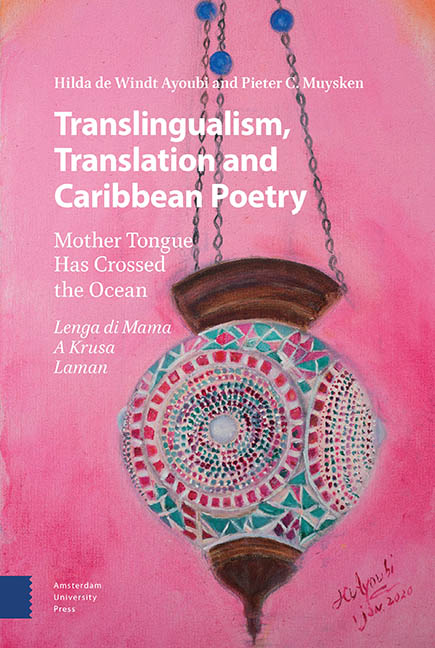Book contents
- Frontmatter
- Dedication
- Contents
- How to Navigate This Book: Kon Nabegá den e Buki akí
- Acknowledgements
- Preface
- Part 1 Introducing the Mother Tongue: Introdukshon di Lenga di Mama
- Part 2 The Poem “Lenga di Mama” and its Translations, Comments and Language Descriptions E Poema “Lenga di Mama” i su Tradukshonnan i Komentario i Deskripshon di e Idiomanan
- Part 3 The Poem “E ‘papiá’ di Papiamentu” and its Translations E Poema “E ‘papiá’ di Papiamentu” i su Tradukshonnan
- Part 4 The Poem “Papiamentu pa Semper” and its Translations E Poema “Papiamentu pa Semper” i su Tradukshonnan: The Translations and Editing of the Poem Hilda de Windt Ayoubi and Pieter Muysken (for Dutch)
- Part 5 The Poem “Riba Ala di Lenga di Mama” and its Translations E Poema “Riba Ala di Lenga di Mama” i su Tradukshonnan
- Part 6 Commentary: Komentario
- Note on the Authors: Informashon tokante e Outornan
- Index: Índise
Constructed Languages: Idioma Konstruí
Published online by Cambridge University Press: 15 September 2022
- Frontmatter
- Dedication
- Contents
- How to Navigate This Book: Kon Nabegá den e Buki akí
- Acknowledgements
- Preface
- Part 1 Introducing the Mother Tongue: Introdukshon di Lenga di Mama
- Part 2 The Poem “Lenga di Mama” and its Translations, Comments and Language Descriptions E Poema “Lenga di Mama” i su Tradukshonnan i Komentario i Deskripshon di e Idiomanan
- Part 3 The Poem “E ‘papiá’ di Papiamentu” and its Translations E Poema “E ‘papiá’ di Papiamentu” i su Tradukshonnan
- Part 4 The Poem “Papiamentu pa Semper” and its Translations E Poema “Papiamentu pa Semper” i su Tradukshonnan: The Translations and Editing of the Poem Hilda de Windt Ayoubi and Pieter Muysken (for Dutch)
- Part 5 The Poem “Riba Ala di Lenga di Mama” and its Translations E Poema “Riba Ala di Lenga di Mama” i su Tradukshonnan
- Part 6 Commentary: Komentario
- Note on the Authors: Informashon tokante e Outornan
- Index: Índise
Summary
Abstract
This short section only deals with oneconstructed language: Esperanto. A constructedlanguage is a language that, instead of havingdeveloped naturally, is consciously devised orinvented. Constructed languages may also bereferred to as artificial, planned or inventedlanguages.
Keywords: Esperanto, Planlingvo,Language Diaspora, Cultural Identity,Transnational Language
Designed in 1887, Esperanto or its morescientific term, Planlingvoj, (plantlanguages), has evolved from a written languageproject (“Fundamento de Esperanto”) into a livinglanguage whose speakers live in Europe, LatinAmerica, Africa, and East Asia. The term Konstruitalingvo or Konstruitaj lingovj (pl) (en: “Constructedlanguages” is hardly used. In Esperanto one usuallyspeaks of Planlingvoj (plant languages, the morescientific term, certainly also in German =Plansprache). While speakers initially wished tocontribute to international understanding, todaythey are mainly motivated by the aspect of being aplaying field for all languages and cultures. Inaddition to translated world literature, it has itsown original literature written directly inEsperanto (represented by Esperanta PEN within PENInternational) and a dynamic music culture.Esperanto is also used as a family language by someinternationally composed families. Some speakersfeel they belong to a chosen language diaspora thathelps shape their cultural identity. The Esperantoculture is transnational and intercultural in natureand defends also a number of values promoted byUNESCO.
Planlingvo (Esperanto) / Esperanto
Denaska Lingvo
Pli ol 6000 lingvoj
estas en la mondo
‒ la plej multaj de minoritato
sed vin, papiamento,
mi havas plej proksime
ĉe mia koro
Ĝuste en vi
mi povas trovi
la plej subtilajn detalojn
kiuj sonas kiel muziko,
tono kaj melodio, kiuj eble
ne ekzistas en la aliaj lingvoj.
Pli ol 6000 lingvoj
estas en la mondo
sed mia denaska lingvo
kiun miaj panjo kaj paĉjo
instruis al mi infanaĝe
tiun mi plej tenas en mia koro Pli ol 6000 lingvoj
estas en la mondo
sed en papiamento
ni verkas literaturon,
en papiamento ni tradukas
la mondan literaturon,
por tie pli altenlevi
nian denaskan lingvon
- Type
- Chapter
- Information
- Translingualism, Translation and Caribbean PoetryMother Tongue Has Crossed the Ocean, pp. 137 - 142Publisher: Amsterdam University PressPrint publication year: 2022

